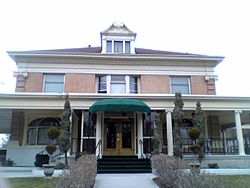Jesse Knight House facts for kids
Quick facts for kids |
|
|
Jesse Knight House
|
|
 |
|
| Location | 185 East Center Street Provo, Utah United States |
|---|---|
| Built | 1905 |
| Architect | Ware Walter |
| Architectural style | Late Victorian, Colonial Revival |
| MPS | Entreprenurial Residences of Turn-of-the-Century Provo TR |
| NRHP reference No. | 82004174 |
| Added to NRHP | July 23, 1982 ] area = less than one acre |
The Jesse Knight House, also known as the Knight Mansion, is a special old house in Provo, Utah, United States. It was built in 1905 for a very rich man named Jesse Knight. This house is so important that it was added to the National Register of Historic Places in 1982. It also became a Provo City Historic Landmark in 1996.
Contents
The Story of the Jesse Knight House
Who Was Jesse Knight?
Jesse Knight was born in 1845 in Nauvoo, Illinois. His family moved west and arrived in Utah in 1850. When he was 18, Jesse married Amanda McEwan. They soon started a ranch in Payson, Utah.
Jesse became very rich after he started a mining business in the Eureka area. He bought more mines, started a bank, and invested in land in Provo. He also bought the Provo Woolen Mills and started farms and cattle businesses in Canada. Even with all his success, Jesse always supported The Church of Jesus Christ of Latter-day Saints. His mines were known as the "cleanest mining camps in the west." Jesse Knight passed away in 1921. He gave a lot of his money to BYU and other organizations.
What Does the House Look Like?
The Jesse Knight House is two and a half stories tall. It was built in the Colonial Revival Style. This style means the house looks balanced and grand. It has fancy details like decorative trim, columns, and special window designs. The architects Walter E. Ware and Alberto O. Treganza helped design this beautiful home.
Provo's Grand Victorian Mansions
Between 1893 and 1908, many large and fancy Victorian mansions were built in Provo, Utah. These homes are important because they show off great architecture. They also belonged to some of the most successful men in the city and state at that time.
The Jesse Knight House is one of these special homes. Other mansions from this time include:
- The Charles E. Loose House
- The William H. Ray House
- The Knight-Allen House
- The John R. Twelves House
- The Knight-Mangum House
- The Thomas N. Taylor House
These houses were built in different fancy styles like Eastlake, Shingle, Craftsman, Italianate, Classical, Moorish, Colonial, and Romanesque. Most of them are made of brick and have very detailed designs.
Jesse Knight and Mining in Utah
Mining for valuable metals and minerals changed Utah's economy a lot. It helped Utah grow from mostly farming to having more industries. The Tintic Mining District, about 30 miles (48 km) southwest of Provo, was started in 1869. By 1899, it was the top mining center in Utah.
Jesse Knight was a key person in the success of Tintic mining. He became wealthy in the mid-1890s with his Humbug mine, which produced a lot of silver. This allowed him to start other mines in the East Tintic area.
Jesse Knight's businesses grew far beyond just the Tintic mines. He owned parts of a power plant, a drain tunnel project, a dry farm, and smelters. His company, the Knight Investment Company, included many different businesses. Some of these were the Bonneville Mining Company, the Knight Woolen Mills, and the Utah Savings Bank.
Protecting the Jesse Knight House
The Jesse Knight House was added to the National Register of Historic Places in 1982. It was part of a group of six important Provo houses that were listed. These houses are:
- The Knight-Mangum House
- The John R. Twelves House
- The Jesse Knight House
- The Knight-Allen House
- The William H. Ray House
- The Thomas N. Taylor House
One other house, the Charles E. Loose House, was also considered important enough to be listed, but its owner did not want it added.
Images for kids
 | Janet Taylor Pickett |
 | Synthia Saint James |
 | Howardena Pindell |
 | Faith Ringgold |



